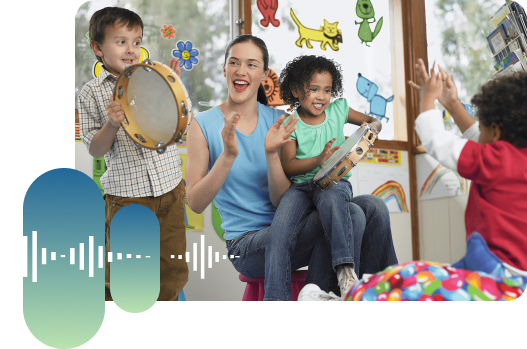
Music Therapy
Music therapy is the skillful use of music and musical elements by an accredited music therapist to promote, maintain, and restore mental, physical, emotional, and spiritual health. Music has nonverbal, creative, structural, and emotional qualities. These are used in the therapeutic relationship to facilitate contact, interaction, self-awareness, learning, self-expression, communication, and personal development.
Canadian Association of Music Therapists / Association canadienne des musicothéraputes Annual General Meeting, Vancouver, British Columbia, May 6, 1994
Music Therapist Credentials


Scope of Practice
The services performed by an accredited music therapist include the knowledgeable use of established music therapy interventions within the context of a therapeutic/psychotherapeutic relationship.
This relationship is developed primarily through music-based, verbal and/or non-verbal communications. Music therapy processes can work to restore, maintain, and/or promote mental, physical, emotional, and/or spiritual health of all persons across the lifespan and functioning continuums (including those who have severe and debilitating cognitive, neurological, behavioural andor emotional disorders such as those outlined in the DSM-5-TR).
Music therapists conduct client assessments, develop and implement treatment plans and processes, evaluate progress, participate in research, provide clinical supervision to students/interns/professionals, work within interprofessional healthcare teams, work in private practice, and act as consultants to other professionals and the general public on the use of music to promote health and well being.
Frequently Asked Questions
Music therapy can serve infants, children, adolescents, adults, and older adults. The following are some examples of client populations:
- AIDS
- Acquired Brain Injury
- Alzheimer/Dementia
- Apraxia
- Autism
- Behavioural
- Cancer
- Child Birth
- Chronic Pain
- Comatose
- Developmentally Delayed
- Dual Diagnosis
- Eating Disorders
- Forensic
- Geriatric
- Grief Work
- Hearing Impaired
- Learning Disabled
- Medical/Surgical
- Mental Health
- Multiply Disabled
- Neurologically Impaired
- Palliative Care
- Parkinson’s Disease
- Physically Disabled
- Post Traumatic Stress
- Private Practice
- Rett Syndrome
- Speech Impaired
- Stroke
- Substance Abuse
- Visually Impaired
- Voice Disorders
- Wellness
Music therapy can be used to address needs in various domains. Please note that this is not an exhaustive list of goals/aims:
Cognitive
- Attention/Concentration
- Development/establishment of activities of daily living (ADLs)
- Executive functions (e.g. decision-making, organization, reasoning, etc)
- Inhibition
- Memory recall and facilitation; reminiscence
Speech/Language and Communication (Verbal and Non-Verbal)
- Articulation
- Expressive communication
- Oral motor development
- Pacing
- Receptive communication
- Respiratory control/strength
- Vocalizations
Emotional
- Emotional regulation
- End-of-life emotional support
- Relaxation
- Self-awareness
- Self-expression
- Skills for coping with anxiety
Physical
- Balance and coordination
- Breath and heart-rate regulation
- Endurance
- Fine motor skills
- Gait training
- Gross motor skills
Sensory
- Auditory sensitivities
- Pain management
- Proprioceptive input (ability to understand where the body is in space)
- Spatial awareness
- Vestibular input (sense of balance, spatial orientation)
- Visual/Auditory/Tactile/Olfactory stimulations & sensations
Social
- Initiating/sustaining social interactions
- Turn taking
- Leading/following directions
- Sharing
- Waiting
Please refer to the MTAO Fee Schedule
Wilfrid Laurier University, located in Waterloo, Ontario, offers both undergraduate (BMT) and graduate (MMT) music therapy programs. Please refer to Wilfrid Laurier University for more information.
The University of Toronto offers a Masters of Music – Applied Music and Health. Please refer to the University of Toronto for more information.

